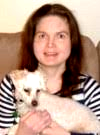Virtual Medical Visits
by RNE submissions on 05/13/18
By Joanna Mechlinski
Nine-year-old Ellie McGinn has a rare genetic disorder called LBSL. (This acronym stands for Leukoencephalopathy with Brainstem and Spinal Cord Involvement and Lactate Elevation – whew!).
It affects her brain and spinal cord, causing the ability to walk, stand and coordinate movement to deteriorate over time. LBSL – which affects approximately 100 people worldwide - has no cure and can be fatal.
At age three, Ellie was among the first LBSL patients to try an experimental mix of antioxidants and amino acids which has kept her disease from progressing.
Now, she’s the world’s first LBSL patient to use new remote technology that helps researchers at Kennedy Krieger Institute in Baltimore gather data about the disease in the hopes of developing new medications.
It would take Ellie and her family – who live in Arlington, VA – about an hour and a half to drive to Baltimore. As with many patients of rare or chronic diseases, pain and exhaustion take their toll, so a three-hour round trip to the clinic would be extremely difficult, especially when appointments are so frequent.
With remote or virtual testing, Ellie puts on movement sensors, then goes through a variety of tests as a team of researchers watch through video chat.
While virtual doctor’s visits are available to some patients in today’s world, ironically patients who might need them the most – those with serious or chronic disease - usually have to see their doctors in person, as virtual visits tend to be aimed toward those with non-emergency needs. The pros of expanding and developing the service, however, are huge. Just like Ellie, many chronic illness patients struggle with pain and exhaustion, so being able to avoid a lengthy ride to a doctor’s office or hospital is definitely beneficial. Many are also unable to drive, so appointments need to be scheduled around the availability of another person. Finally, there’s the fact that medical environments make a lot of people feel nervous. Home, on the other hand, is always where a person feels most comfortable, so they are likely to be more relaxed when answering a doctor’s questions or performing tests.
With patients like Ellie leading the way, we need to keep supporting the development of this technology. It can quite literally transform the lives of countless patients.
https://www.webmd.com/brain/news/20180423/girl-with-rare-disease-races-time-via-virtual-tech



